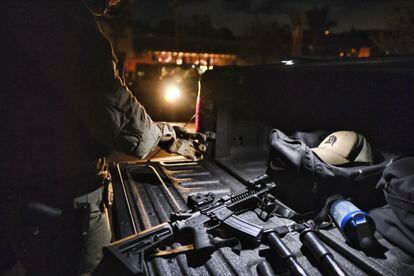An anti-narcotics agent prepares for an operation against the Jalisco New Generation Cartel, on March 11, 2020. Richard Vogel (AP)
Mexico has dissolved the specialized anti-narcotics unit that had been working for a quarter of a century in coordination with the United States Drug Enforcement Agency (DEA) to deal with organized crime, which has dealt a heavy blow to bilateral cooperation in security matters , two anonymous DEA sources told
Reuters
.
The Mexican government formally informed the DEA in April last year that the unit had been closed.
Both the Mexican Ministry of Public Security and the DEA have declined to respond to repeated requests for comment on the matter.
No one had reported so far on the closure of the unit.
Reuters
has not been able to find out why the Mexican government did not announce it publicly at the time.
The group was one of the Sensitive Investigation Units (SIU) that operate in some 15 countries and are considered essential to US agents working to dismantle smuggling networks and capture drug lords. the drug.
These units are trained by the DEA, but remain under the control of national governments.
A second Mexican unit of the SIU, based within the Office of the Attorney General of the Republic and independent of the Government, continues to operate.
"They strangled her," said one of the agents who did not want to be identified, referring to the police unit.
"It shatters the bridges that took us decades to build."
In Mexico, the more than 50 agents of this unit were considered among the best trained and participated in the capture, among others, of Joaquín
El Chapo
Guzmán, one of the great leaders of drug trafficking, head of the Sinaloa cartel.
Cooperation between Mexico and the United States joins efforts to combat some of the world's largest organized crime networks.
Mexico is one of the epicenters of the multibillion-dollar global drug trade, and the annihilation of this unit threatens to make it more difficult to capture and prosecute mafia leaders.
The shutdown could prove costly on the streets of the United States, where authorities are struggling to curb a surge in overdoses that last year led to more than 100,000 deaths, mostly linked to a new wave of synthetic drugs, such as fentanyl, produced by Mexican cartels.
The elite team, founded in 1997, was the main conduit for the DEA to share clues about drug shipments and evidence obtained on US soil with the Mexican government.
For Mike Vigil, former head of international operations for the DEA, the closure of the SIU and the restriction of security cooperation by the president will harm both countries.
“It will mean more drugs going to the United States and more violence in Mexico,” he warned.
The closure of the SIU is the latest example of a breakdown in cooperation between the DEA and Mexico since López Obrador took power in 2018 and promised to reform national security policy.
Angered by the rapid bloodshed he blamed on the heavy-handed tactics of his predecessors, the president sought to implement a less confrontational policing style and vowed to address what he says are the root causes of the violence, such as poverty. instead of going after the cartel bosses.
The president also made it difficult for foreign security officials to operate inside Mexico, reprimanding the DEA because, in his opinion, they interfered with his country's sovereignty.
Privately, US officials point out that Mexico's vital role in blocking the flow of migrants from Latin America, a priority for Washington, allows them limited ability to pressure López Obrador on other issues, such as security cooperation.
A head of the SIU, convicted of collaborating with drug traffickers
Although the SIU's reputation was damaged when its former boss Iván Reyes was arrested in 2017 and pleaded guilty in a US court to taking bribes to leak information to a drug gang, DEA officials viewed the unit as vital and needed Mexican agents to support their investigations in the country.
The alarm about the future of this unit jumped in 2019, when López Obrador suspended the activity of the Federal Police, within which the SIU was, to create the National Guard.
DEA agents continued to work with their Mexican counterparts for a time, especially at the Mexico City airport, where members of the group intercepted smuggling of fentanyl, which is blamed for the skyrocketing increase in overdoses in the United States.
But security cooperation between the DEA and Mexico collapsed in October 2020, when former Mexican Defense Secretary Salvador Cienfuegos was arrested in Los Angeles, alleging he was colluding with a drug cartel.
US prosecutors quickly released Cienfuegos, citing “sensitive” foreign policy considerations, but López Obrador accused the DEA of being “unprofessional” and fabricating evidence in the case.
In December 2020, the Mexican government stripped foreign agents of diplomatic immunity and forced local officials to write reports on interactions with foreign security agents.
"That was the nail in the coffin," the DEA agent considered.
Months later the SIU was closed.
At the time the unit was formally disbanded, according to that source, it had already been inoperative for some time, because the National Guard put deterring violence before drug cartel investigations.
With more than 33,000 homicides recorded in Mexico last year, Vigil said it makes no sense to shut down an elite unit that goes after the organized crime groups responsible for most of the killings.
"Mexico is shooting itself in the foot," he said.
subscribe here
to the
newsletter
of EL PAÍS México and receive all the informative keys of the current affairs of this country

